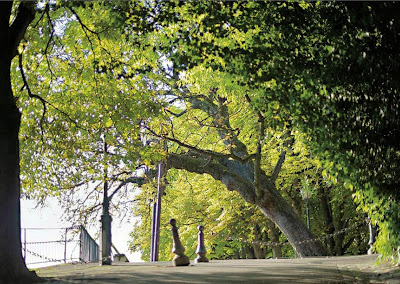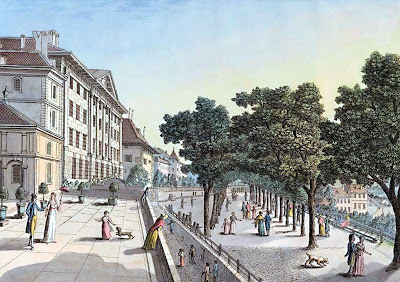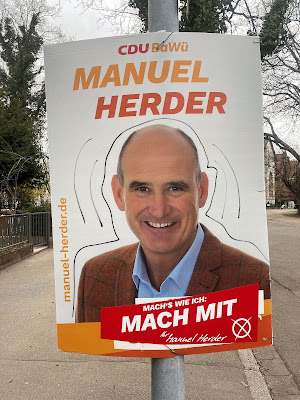Germany is actually experiencing an exponential increase in corona infections
that passed the magic 100 a few days ago.

|
|
Following the last conference on March 3 the president of the Bundesrat (Senat), Berlin's ruling mayor Michael Müller, presented a step-by-step corona opening plan on one sheet of paper. |
The emergency brake means that the additional openings in public life envisaged for March 22 would not become effective. Red Baron, still
suffering from muscle loss following his hip surgery, would miss, in
particular, the opening of Kieser Training.

|
| The situation in Freiburg 10 days ago: The retail sector is open. |
While all Kieser appointments were still blocked last week, I suddenly could reserve two-time slots for this and one for the coming week. Will these reservations remain valid?
On March 22 at 3 p.m., the scheduled video conferencing between Germany's governors and the chancellor started, but their views on the corona crisis were controversial. At a certain point, discontent and referring to the Notbremse, Angela Merkel said, "We resolved today, honoring what we decided last time. That is too little at a time of exponential growth in infection rates. Like this, we cannot stand before the people. "
Merkel demanded a break. Initially, there was talk of 15 minutes that eventually turned into almost seven hours. Meanwhile, the governors continued the discussions in small groups. The full meeting resumed around 1 a.m. on Tuesday and finally reached a compromise.

|
| Angela Merkel at 2:40 a.m. on March 23 |
At 2:30 a.m., the chancellor stepped in front of the press and greeted the
waiting journalists with, "Good morning, everyone."
"Given the spread of the virus variants and rising infection figures, Germany is in a very, very serious situation," Merkel said. "We have not yet been able to defeat the virus; it is not letting up." The crucial terms are "caution and flexibility," the chancellor added.
Eventually, the governors and the chancellor agreed on the following:
- the present lockdown in Germany will be extended until April 18
- the strict contact rules in vigor are not to be relaxed even for visits to relatives over Easter
- all businesses, including supermarkets, will be closed over the Easter holidays from April 1 to 5, including Maundy Thursday and Holy Saturday. These latter days are called Ruhetage. The translation is difficult. Are Ruhetage rest days, days off, closing days, or even quiet days like Henri Miller's in Clichy? They were indeed intended to be like Sundays, i.e., closing days.
"Given the spread of the virus variants and rising infection figures, Germany is in a very, very serious situation," Merkel said. "We have not yet been able to defeat the virus; it is not letting up." The crucial terms are "caution and flexibility," the chancellor added.
Eventually, the governors and the chancellor agreed on the following:
- the present lockdown in Germany will be extended until April 18
- the strict contact rules in vigor are not to be relaxed even for visits to relatives over Easter
- all businesses, including supermarkets, will be closed over the Easter holidays from April 1 to 5, including Maundy Thursday and Holy Saturday. These latter days are called Ruhetage. The translation is difficult. Are Ruhetage rest days, days off, closing days, or even quiet days like Henri Miller's in Clichy? They were indeed intended to be like Sundays, i.e., closing days.
The following morning the federal states sharply criticized that the so-called Easter lockdown had not been prepared. Many details were completely unclear: Will there be driving bans for trucks on the autobahns on Maundy Thursday? Would all supply chains be secured? How will hospitals handle the days off? Who will reimburse businesses for extra vacation days? Closed Holy Thursday raised more questions than answered, and even some of Merkel's party members rose in protest.
Then in the early afternoon and in an about-face, Angela Merkel again went
in front of the press, saying these newly decreed Ruhetage were a
mistake. "I say it clearly: This mistake is solely my mistake because, in the end, I bear the ultimate responsibility for everything,
qua office. And it is important to me to say this here as well: A mistake must be named as a mistake and, above all, must be corrected,
and if possible, this must be done in good time."

|
|
The beauty of politics is that it is so predictable! No matter what they do, it's always, always, always wrong! And you can always, always get so excited! You also have to praise them sometimes! |
"I deeply regret this, and I ask all citizens to forgive me. I regret this
additional uncertainty all the more because, unfortunately, we are in the
middle of the third wave of the pandemic triggered by the mutation. Once
again, I would like to thank everyone whose behavior is helping to slow
down and stop the third wave with its deadlier and more contagious
mutation of the coronavirus."
Well said, chancellor, although one Catholic journalist wrote Merkel culpa. So the "days of rest" on Maundy Thursday and Holy
Saturday are annulled. In substance, it means that not much remains of
the recent conference.

|
| Botched vaccination start |
The number of deaths due to corona declining both in the States and in Germany shows the effect of vaccinating the older generation. However, this positive trend is poorly compensated by people of the younger generation getting over proportionately infected and filling the intensive care wards instead.
*





















